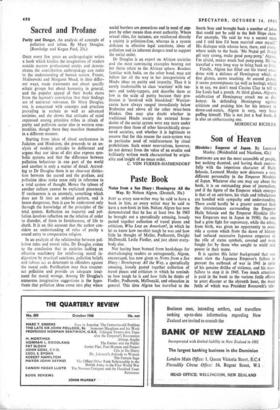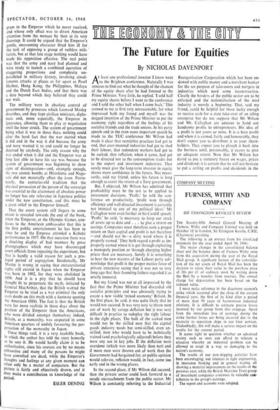Hirohito : Emperor of Japan. By Leonard Mosley. (Weidenfeld and
Nicolson, 42s.)
Son of Heaven
EMPERORS are not the most accessible of people, but nothing daunted, and having dealt success- fully with the imperious character of Haile Selassie, Leonard Mosley now discovers a very different personality in the Emperor Hirohito of Japan. Whatever else one may say about the book, it is an outstanding piece of journalism, and if the figure of the Emperor which emerges is that of an anti-hero, his trials and tribulations are handled with sympathy and understanding. There could hardly be a greater contrast than the circumstances surrounding the Emperor Haile Selassie and the Emperor Hirohito (the two Emperors met in Japan in 1956); the one had a grim fight for supremacy, while the other, from birth, was given no opportunity to over- ride a system which from the dawn of history had reduced successive Japanese emperors to the role of status symbols, coveted and even fought for by those who sought to wield real power in their name.
It is against this latter background that one must view the Japanese Emperor's failure to prevent the outbreak of war in 1941 in spite of his genuine dislike of violence, and his near- failure to stop it in 1945. Too much attention is paid in the book to the various futile efforts to avert disaster at the eleventh hour, the most futile of which was President Roosevelt's tele- gram to the Emperor which he never received, and whose only effect was to divert American attention from the menace by then at its very doorstep. It could be argued that the Emperor's gentle, unassuming character fitted him ill for the task of opposing a group of ruthless mili- tarists, but at that late stage nothing would have made his opposition effective. The real point was that the army and navy had planned and were ready to launch a combined operation of staggering proportions and complexity un- paralleled in military history, involving simul- taneous attacks at places as far apart as Pearl Harbor, Hong Kong, the Philippines, Malaya and the Dutch East Indies, and that there was a date beyond which they believed they could not wait.
The military were in absolute control of government by processes which Leonard Mosley describes, and they kept civilian ministers, diplo- mats and, more especially, the Emperor in ignorance, allowing them to play at negotiation until the hour struck. The system of government being what it was in those days, nothing could alter the hard fact that the war started when it did and in the way it did because the army and navy wanted it to and could no longer be deterred by anybody. The only reason why the war ended when it did and the Emperor was at long last able to have his say was because the system of government was beginning to show signs of disintegration—and, strangely enough, the two atomic bombs at Hiroshima and Naga- saki did not materially affect the issue. Fortu- nately, the centuries-old tradition that the physical possession of the person of the sovereign was essential to the attainment of absolute power no longer has any relevance in Japanese politics under the new constitution, and this must be a great relief to the Emperor himself.
That the court system still lingers to some extent is revealed towards the end of the book, when the Emperor, at the Olympic Games, con- fesses to the American ambassador that this is the first public entertainment he has been to since he and the Empress attended a Kabuki performance in 1957. On that occasion there was a shocking display of bad manners by press photographers which may have discouraged court officials from repeating the experiment, but that is hardly a valid reason for such a pro- loged period of segregation. Incidentally, Mr Mosley is wrong in saying that extraterritorial rights still existed in Japan when the Emperor was born in 1902, for they were abolished in 1899. And it is a pity that he should have thought fit to perpetuate the myth, initiated by General MacArthur, that the British wanted the Emperor to be tried as a war criminal (he only casts doubt -on this myth with a footnote quoting the American OSS). The fact is that the British Were far more realistic in those days about the position of the Emperor than the Americans, who were divided amongst themselves; indeed, Britain, as a monarchy, was suspected in some American quarters of unduly favouring the per- petuation of the monarchy in Japan.
These things said, it is a very readable book, in which the author has told the story honestly as he sees it. He would hardly claim it to be authoritative, since his sources are by no means exhaustive and many of the persons he might have consulted are dead, while the Emperor's thoughts and feelings at any given moment can often only be a matter of conjecture. But the picture is fairly and objectively drawn, and it does make a contribution to knowledge of the Period.
ESLER DENING







































 Previous page
Previous page